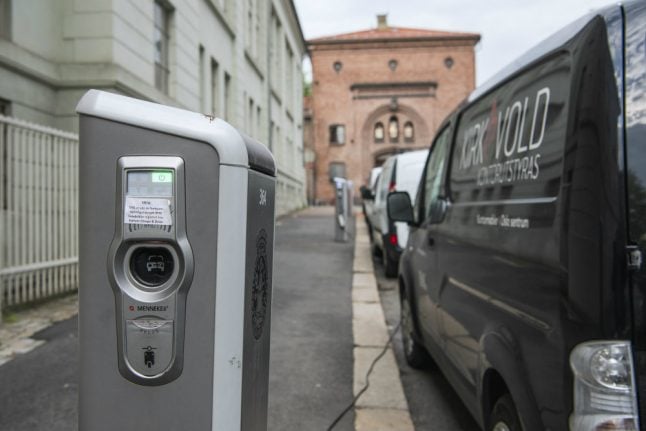ENVIRONMENT
How Norway’s new carbon tax could impact you
Norway’s government is implementing a range of ambitious measures to cut emissions, including a tripling of the CO2-emission tax. But what does this mean for you?
Published: 11 January 2021 18:07 CET

An electric vehicle charging in Oslo in 2019. File photo: AFP
“The government is introducing a plan for a complete restructuring of society until 2030,” the government announced in a press release Friday, as it unveiled the new Climate Plan for 2021-2030.
According to the plan, Norway will to slash its national CO2-emissions by 50-55 percent. The cuts will be in sectors such as transport, waste, agriculture and construction, as well as some emissions from industry and the oil and gas sector.
A key measure to achieve the goal is a large emission tax hike, which is set to triple – from 590 kroner per ton of CO2 today to 2,000 kroner per ton in 2030.
This will not, however, mean an increase in other taxes and levies, the government insists.
Yet some commentators are sceptical about the pledge, and fear higher taxes may be passed on as price increases to the consumer.
Head of the Norwegian airline company Widerø, Stein Nilsen, has warned that the airline may not be able to function at today’s level.
“This is dramatic,” he told newspaper VG. “We have no profitability to handle this. We will not be able to maintain the routes we operate today with this tax level.”
Personal economist and Executive Director of Retail Banking and BN Bank, Endre Jo Reite, believes the tax could mean a price hike of a few hundred kroner for a distance equivalent to Oslo-Bergen.
Minister of Climate and the Environment, Sveinung Rotevatn, also admits that the tax may lead to higher fuel prices. He nevertheless believes most consumers will not notice the change.
“None of the new taxes apply to private individuals,” he said, “But the general increase in the CO2 tax will impact which car you benefit from buying from now on, because the most fossil intensive producers will lose out on the higher CO2 tax.”
Voices in the opposition also fear that the plan will have adverse consequences for society overall.
“This may mean outsourcing Norwegian jobs,” Jon Georg Dale from the right-wing Progress Party told news agency NTB Friday.
“Businesses may end up just moving their emissions and production to other countries,” he added.
Url copied to clipboard!


 Please whitelist us to continue reading.
Please whitelist us to continue reading.
Member comments